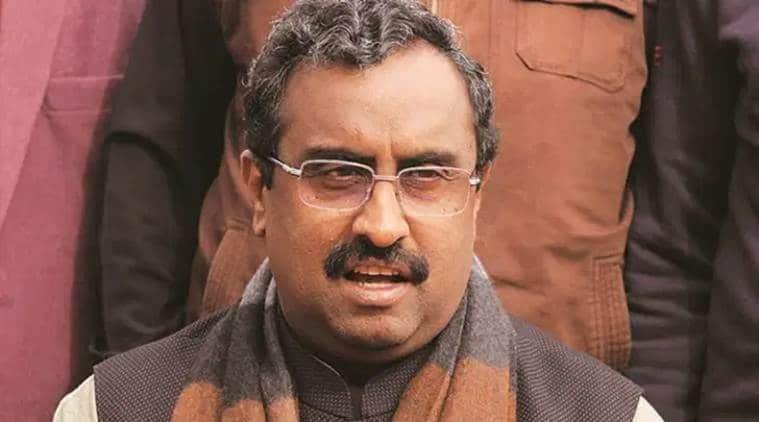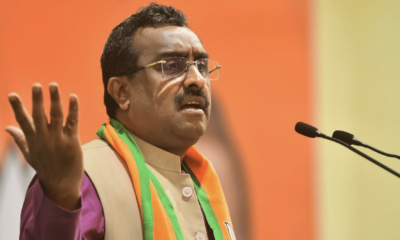
|
Getting your Trinity Audio player ready...
|
BJP general secretary Ram Madhav speaks to The Indian Express on the LAC showdown and India’s prospects in post-Covid world.
You have been talking about India’s prospects of emerging as a global leader in the post-Covid era. How do you assess the scenario now?
A lot of changes will take place in the global order post Covid. The global agenda will also undergo a major change. There’s already a lot of talk over the efficacy or otherwise of the global institutions that were created 25 years ago. This is the 75th anniversary of the UN also and there’s so much talk about less effectiveness or less relevance of the UN in the present situation. All these suggest that post Covid, the world order is going to see a lot of new developments, new agenda coming up on the high table and in that changed scenario, India has to play a proactive role. Because the new world order is going to be more Indo-Pacific centric as it was centred over Pacific Atlantic in the last century. The Western Europe-America axis has now shifted to Indo-Pacific. We are one of the major powers in this region, so we should be prepared to play a major role.
Do you see the recent developments at the borders changing it?
Firstly, we must remember whatever happened at the Indo-Tibetan border between India and China is not something that has happened for the first time. Casualties happened after a long time, but incursions and border tension have been there for decades. After Prime Minister (Narendra) Modi took over, there is a change in approach. What I mean by change is that today we are confronting, we are engaging physically also to prevent them from approaching into our territory. It happened in Doklam in 2017 and Galwan valley in 2020. That has certainly attracted the attention not only of China, but the entire world. India’s priorities remain the same – to emerge as a strong economic power, look for a greater role in its immediate neighbourhood, in Indo-Pacific region.
Does this episode not underline the failure of summit-level diplomacy with China?
India has always maintained good relations with all its neighbours, including China. Even when Indian and Chinese forces were standing eyeball to eyeball in 1986 onwards, summit-level visit took place and then Prime Minister Rajiv Gandhivisited China and met Deng Xiaoping. Bilateral relations and border tension went on together. I don’t think there is any reason why we should assume that the border conflicts, whatever is happening now, should lead us to end our bilateral relations. We should use it to put pressure on China to desist from these activities. That’s why our government has taken a new approach i.e. proactive diplomacy while having strong ground posturing. The world has seen to what extent we can go. We will also engage with China, both at military and diplomatic level.
But then what went wrong?
Why these things are happening at the Indo-Tibetan border is anyone’s guess. Different scholars have given different interpretations. One fact remains that in the last five-six years, there is a noticeable change on our side with regards to border management. We are no longer taking the incursions of PLA lightly. We are determined to strengthen our border infrastructure, secure every inch of our territory for which we are ready to physically engage with the intruders. This policy shift which has started in the last 4-5 years has certainly alerted the Chinese side. The Doklam stand-off from China’s point of view was a totally big jolt to them — that India could mobilise its forces, refuse to change the mobilisation until China withdrew its structure. China also sees the infrastructure development from a different point of view. Many other reasons are cited and one of them is the present internal situation in China. Whatever is happening in the Chinese leadership and the CPC influence its moves. CPC is a very hierarchical organisation with former elders, former presidents and their families holding a lot of command and respect and a sway over the entire party’s infrastructure and mechanism. It is not prudent for me to speak at length, but many such things could have led to the recent developments.
There’s a view that India had succumbed to Chinese pressure when MEA issued instructions in 2018 against participation in any events to mark 60 years of the Dalai Lama’s exodus from Tibet. Your comment?
His Holiness the Dalai Lama is our revered guest, he is spreading the message of Buddhism and we respect him for his wisdom as a spiritual leader. He loves India and its people. In the last five-six years, our government has always sent official representatives to participate in the events of his Holiness. I attended last year and the year before that. Participation at the ministerial level has happened in the past few years.
But in 2018, MEA advised the central and state functionaries to avoid going to events organised by Tibetan leaders.
Not to my knowledge.
The ruling party and the government are under criticism for the country’s neighbourhood policy. Even Bangladesh was riled up by the Citizenship Amendment Act? Did Nepal surprise you?
We have good relationships with our neighbours. When domestic issues come, some of the neighbourhood countries would have an issue as a fallout of the internal issues. But those are very temporary and through diplomatic channels, we sort them out. Today, other than the traditional problem with Pakistan and China, we have noticed some misunderstanding at the India-Nepal front. With others, we have very good bilateral relations.
Nepal’s position is historically not tenable. There could be their own internal reasons for taking this position. But the relationship between India and Nepal is not just a relationship between two countries, it is a relationship of thousands of years. At the government level, at the diplomatic level, there’s an engagement between the two countries and I am confident that the issue will be resolved.
The Indian government has taken some steps against Chinese businesses. Are they going to be effective when you do it without even mentioning China? The government has not said anything on retaliatory steps against China?
Thinking about the action against Chinese apps had been going on for sometime. There have been a lot of deliberations. Now the government has taken a decision to ban some of them. As far as the boycott of Chinese products is concerned, one must remember the government has not given any call, it’s a people’s sentiment.
Does this veiled threat work with China?
Well, why did Mahatma Gandhi give a call to boycott foreign products during the freedom movement? Why did Savarkar take that call? It is a national sentiment. When people feel anguished about a neighbour’s action, there will be a strong sentiment. Obviously, it will have its own economic impact.
On the economy front, do you think the guiding principles of the economic policies of this government have yielded any results?
We have brought India to fifth position from ninth in 2013. We almost touched Rs 3 trillion and almost touched Rs 5 trillion. Our economic philosophy is simple: we want India to rise as a strong economic power not just in our region, but in the world. We have to reach the third position by 2030.
But the poor state of economy seems to have acted as a comorbidity when the country is struck with Covid 19. A number of experts pointed out that the current crisis in MSMEs is because of the moves like demonetisation?
There is no doubt that Covid has affected our economy, but linking it to demonetisation is a defeatist argument. It is five years old after we have built a stronger economy and reached the fifth position. It’s totally baseless analysis. The Covid crisis is not limited to India. Even the harshest prediction about India’s economy is that it would go down to 5-4 percentage whereas for many countries it is negative. It is not all that bleak. We have realised that the MSME sector, a key job sector; we have announced a package. Almost Rs 4 lakh crore is for that sector. We are conscious of the challenges Covid has created.
How do you see the Congress seeking clarification on the border issues? Do you think it will play against the country’s interests?
Of course it will. Even many in the Opposition are counselling the Congress leadership. Congress is trying to take political mileage out of it and in the process, just like they helped Pakistan in the past, they will end up helping China.
But BJP as an opposition had even harsher criticism
Not true at all. We never questioned the Armed Forces. They tweeted why the soldiers were not allowed to carry weapons. Their behaviour is extremely disappointing.
A new controversy has been created over the donations to the RGF and PM CARES?
PM CARES is a trust instituted by the government and those companies which have contributed have their offices in India. How can you compare RGF with PM CARES? It’s totally a family trust of Sonia Gandhi and (her) two children. How can it take funding from Communist Party of India? We are not even talking about one leader going and visiting. It happens when you have bilateral ties. But how can you take money from that political party?
(The interview was originally published in Indian Express on July 1, 2020. Views expressed are personal.)



